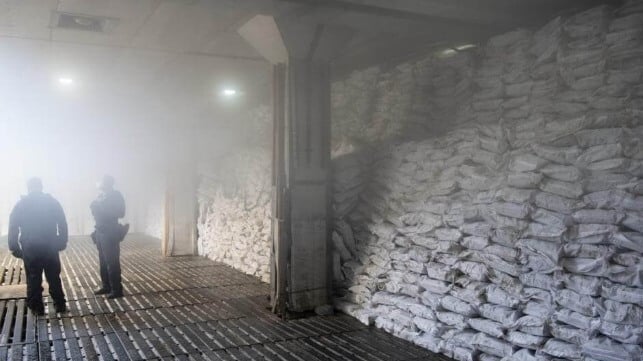Something Is Starting to Smell Fishy About the Global Seafood Supply Chain

The past half year has seen a steady stream of disturbing reports about serious human rights abuses tied to industrial fishing. First came a long expose about forced labor at sea tied to hundreds of Chinese fishing ships that supply many of the biggest restaurant and grocery store chains in the US and Europe. Then the investigations moved on land, exposing the widespread use by Chinese processing plants of state-sponsored forced labor — specifically North Korean and Uyghur workers, both of which are strictly banned from being tied to any products imported into the US.
Then last week this harsh spotlight shifted to India. A whistleblower, named Joshua Farinella, leaked thousands of pages of internal documents, invoices, emails, recorded zoom calls, security footage, whats app exchanges tied to a shrimp processing plant where he was the manager. The story was important for Americans since a third of the shrimp they eat comes from India. The documents seem to back up the whistleblower’s statements and raise a variety of serious concerns about human rights abuses tied to workers at the Indian plant as well as food safety issues relating to shrimp possibly having been shipped to the US that tested positive for antibiotics.
The whistleblower is an American and a longtime seafood industry executive, and he showed unusual bravery in leaking the documents since he likely just threw his entire career away in doing so. Aside from talking to reporters, he followed other proper channels, by filing federal whistleblower complaints to law enforcement officials at the State Department, Customs and Border Patrol, the Labor Department and the FDA, who have already spoken with him and begun investigating.
Congress last week also formally wrote the whistleblower to request the documents as they too intend to investigate the plant. That is often a precursor to hearings. For the risks taken and bravery shown in leaking the documents, podcasters have dubbed the whistleblower, the “Snowden of Seafood”, and he has also been hailed publicly as a “superhero” by a variety of advocates and others, including the Hulk. (The actor Mark Ruffalo posted a message saying the whistleblower was a real-life superhero for his actions). The company at the center of the disclosures takes a different view and has categorically denied that it did anything illegal or unethical.
The story about conditions at the shrimp plant in India come against a broader backdrop. The same week that the whistleblower documents were published, the Corporate Accountability Lab, which is an advocacy group of lawyers and researchers, released a report detailing severe cases of captive and forced labor as well as environmental concerns often tied to wastewater at a variety of other shrimp plants in India.
It’s worth remembering the history here. Labor abuse tied to seafood is not a new problem. The New York Times and the Associated Press covered the issue extensively a decade ago, especially tied to Thailand. Even before that, a human rights NGO called the Environmental Justice Foundation revealed in 2013 widespread problems with forced and child labor in Thai shrimp. The EJF report and subsequent news coverage spurred a series of sweeping reforms by the Thai government to better protect workers from such abuses. But these reforms came with a price, leading to escalating labor costs in Thailand right when nearly half of the country’s shrimp production was wiped out by a disease. India emerged to fill the void, with help from its government which bolstered subsidies and loosened laws restricting foreign investment. By 2021, India was exporting more than $5 billion of shrimp globally, and was responsible for nearly a quarter of the world’s shrimp exports.
And yet, here we are again: the seafood problems previously highlighted in Thailand are now being widely revealed in China and India.
Part of the problem with global seafood is that companies and governments barely know where these ships are working, much less how they are behaving. A new study published in the journal Nature in January 2024 revealed that 75 percent of the world’s industrial fishing fleet are not publicly tracked. The study, using machine learning and satellite imagery, detected vessel activity at sea that was previously “dark” in marine protected areas and in countries' waters that previously showed significantly less of a fishing footprint. If we dont know where the ships are, we surely dont know if the workers on them are trafficked.
Even on land, companies and governments are minimally informed about what is happening at the fish farms and processing plants partly because the audits that are meant to verify ethical and legal conditions tied to worker treatment, food safety, and ocean sustainability are deeply flawed.
Labor researchers, unions, academics and industry consultants have warned that these concerns will keep popping up until major buyers — in particular the restaurant and supermarket companies — decide to fix their supply chains so that they know what is happening at every step along the way, from bait to plate. These experts also say companies need to stop relying on auditing firms that claim to be checking for things in places (like India and China) where they actually have limited capacity to do so effectively.
Until then, the rotten smell inside this industry is likely going to get worse.

that matters most
Get the latest maritime news delivered to your inbox daily.
Ian Urbina is the director of The Outlaw Ocean Project, a non-profit journalism organization based in Washington DC that focuses on environmental and human rights concerns at sea globally.
This essay originally appeared in Time and may be found in its original form here.
The opinions expressed herein are the author's and not necessarily those of The Maritime Executive.
